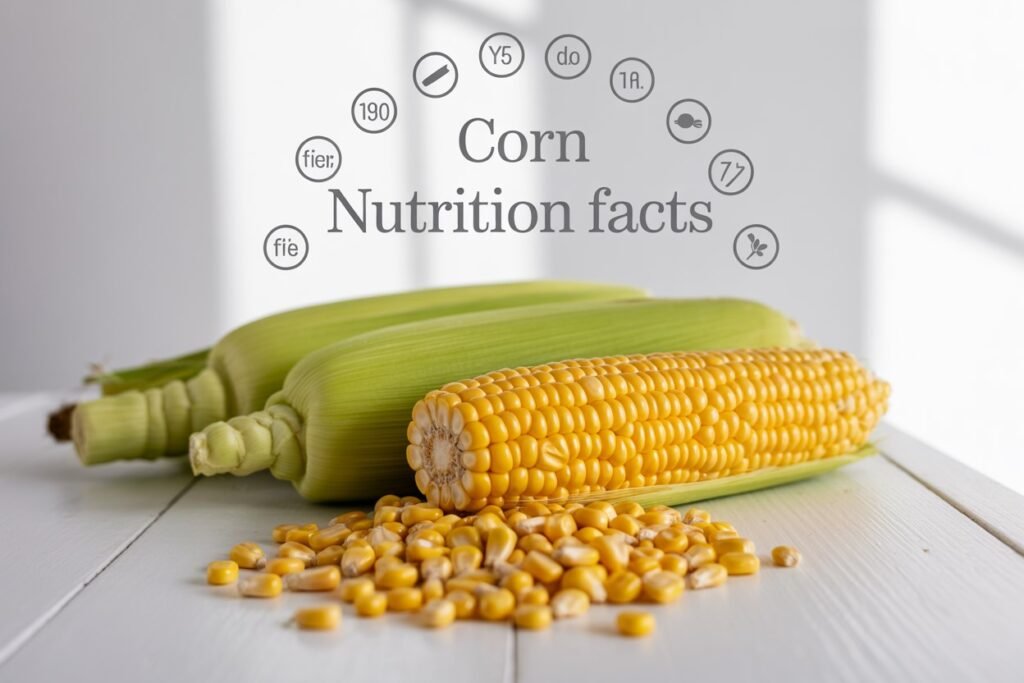Corn is one of the world’s most widely consumed grains, but many people don’t realize just how packed with nutrients this golden kernel really is. The nutrition value of corn makes it a valuable addition to any balanced diet, offering everything from essential vitamins to plant-based protein.
This guide is perfect for home cooks, health-conscious eaters, and anyone curious about getting more nutritional bang for their buck from everyday foods. We’ll break down the essential nutrients you’ll find in corn and explore the real health benefits of adding it to your meals. You’ll also discover how different processing methods affect corn’s nutritional profile, so you can make smarter choices at the grocery store.
Essential Nutrients Found in Corn

Plant-Based Protein Content
Corn serves as a wholesome source of plant-based protein, making it a valuable addition to vegetarian and vegan diets. This essential macronutrient plays a crucial role in building and repairing tissues, supporting immune function, and maintaining healthy muscle mass. The protein content in corn provides the body with amino acids necessary for various physiological processes, though it’s important to combine corn with other protein sources to ensure a complete amino acid profile.
The plant-based protein found in corn offers an accessible and affordable option for those seeking to reduce their reliance on animal proteins. This makes corn particularly beneficial for individuals following plant-based eating patterns or those looking to diversify their protein sources throughout the day.
Dietary Fiber Benefits
As a wholesome source of fiber, corn contributes significantly to digestive health and overall well-being. The dietary fiber content supports proper digestion by promoting regular bowel movements and helping to maintain a healthy gut microbiome. This insoluble fiber adds bulk to stool, which can help prevent constipation and support optimal digestive function.
The fiber in corn also plays a role in blood sugar regulation by slowing the absorption of sugars into the bloodstream. This can help maintain steady energy levels throughout the day and may contribute to better glycemic control. Additionally, adequate fiber intake supports feelings of satiety, which can be beneficial for weight management and appetite regulation.
Key Vitamins and Minerals
Corn stands out as a wholesome source of key vitamins and minerals that support various bodily functions. The nutrition value of corn includes essential micronutrients that contribute to overall health maintenance and disease prevention. These vital compounds work synergistically to support cellular processes, energy metabolism, and tissue repair.
The mineral content in corn supports bone health, nerve function, and cardiovascular health, while the vitamin profile contributes to immune system support and antioxidant protection. These micronutrients make corn a nutritionally dense food choice that can help individuals meet their daily nutrient requirements as part of a balanced diet.
Health Benefits of Corn Consumption

Gluten-Free Natural Alternative
Corn stands out as a delicious and healthy addition to the kitchen, making it particularly suitable for individuals following a gluten-free diet. Unlike wheat, barley, and rye, corn naturally contains no gluten proteins, making it a safe and nutritious option for those with celiac disease or gluten sensitivity. This natural grain provides a nutritious way to enhance meals while maintaining dietary restrictions without compromising on taste or nutritional value.
The versatility of corn in gluten-free cooking extends beyond simple substitution. From cornmeal for baking to whole kernels for salads and side dishes, corn offers numerous culinary applications that can transform gluten-free meal planning. Its natural sweetness and satisfying texture make it an excellent base for various dishes, ensuring that dietary restrictions don’t limit culinary creativity.
Support for Digestive Health
Now that we have covered corn’s gluten-free benefits, it’s important to understand how this grain supports overall digestive wellness. Corn provides essential dietary fiber that promotes healthy digestion and regular bowel movements. This fiber content helps maintain a healthy gut environment by supporting beneficial bacteria growth and improving overall intestinal function.
The digestive benefits of corn extend to its gentle nature on the stomach lining. As a naturally occurring whole grain, corn is easily processed by most digestive systems, making it an ideal choice for individuals with sensitive stomachs or those recovering from digestive issues.
Sustained Energy from Complex Carbohydrates
With this in mind, corn’s complex carbohydrate structure provides sustained energy release throughout the day. Unlike simple sugars that cause rapid spikes and crashes in blood glucose levels, corn’s complex carbohydrates break down gradually, providing steady fuel for both physical and mental activities. This makes corn an excellent choice for athletes, active individuals, and anyone seeking consistent energy levels throughout their daily routine.
Comparing Corn Processing Methods and Nutritional Impact

Stone-Ground vs Processed Corn Products
The method used to process corn significantly affects its nutritional value, with stone-ground varieties maintaining superior nutrient profiles compared to highly processed alternatives. Stone-ground corn products are produced in small batches using traditional milling techniques that preserve the grain’s natural nutrients, flavor, and freshness. This careful processing approach stands in stark contrast to industrial methods that strip away essential components.
The key advantage of stone-ground processing lies in its ability to retain corn’s essential oils and fiber content. These components are crucial for maintaining the nutrition value of corn, as they provide beneficial fats, dietary fiber, and fat-soluble vitamins that support overall health. Overly processed corn products lose these valuable elements during manufacturing, resulting in nutritionally inferior food products.
Nutrient Retention in Traditional Milling
Traditional milling processes demonstrate remarkable efficiency in preserving corn’s inherent nutritional properties. The stone-grinding method operates at lower temperatures and speeds compared to modern industrial processing, which helps maintain the integrity of heat-sensitive vitamins and minerals naturally present in corn.
This gentle processing approach ensures that the corn’s essential oils remain intact within the final product. These oils contain important fatty acids and contribute to the overall nutrition value of corn by providing energy and supporting cellular functions. The preservation of fiber content through traditional milling also maintains the grain’s ability to support digestive health and provide sustained energy release.
Benefits of Organic vs Conventional Corn
Organic corn offers distinct advantages over conventionally grown varieties, particularly in terms of chemical residue exposure and production methods. USDA Certified Organic and non-GMO heirloom corn varieties are cultivated using regenerative and biodynamic farming methods that prioritize soil health and environmental sustainability.
These organic corn products are completely free from synthetic pesticides, herbicides, and chemical fertilizers, ensuring consumers avoid potentially harmful chemical residues while maximizing the nutrition value of corn. The absence of synthetic inputs allows the corn to develop its full nutritional potential naturally, resulting in products that contain optimal levels of vitamins, minerals, and beneficial compounds inherent to the grain.
Practical Ways to Include Corn in Your Diet

Cooking and Baking Applications
Cornmeal stands out as a versatile ingredient that transforms everyday recipes into nutritious, flavorful dishes. When considering the nutrition value of corn, incorporating cornmeal into your cooking and baking repertoire offers an excellent way to harness its nutritional benefits while creating delicious meals.
Classic baking applications showcase cornmeal’s exceptional versatility. You can create traditional cornbread that serves as a perfect accompaniment to soups, stews, and barbecue dishes. Cornmeal muffins provide a hearty breakfast option, while cornmeal pancakes offer a delightful twist on weekend brunches, delivering both taste and nutritional value.
Beyond traditional baking, cornmeal excels as a coating ingredient for various proteins and vegetables. Its natural texture creates crispy, golden exteriors when used to coat fish, chicken, or vegetables before frying. This application not only enhances flavor but also adds the nutritional benefits of corn to your protein dishes.
Versatile Meal Preparation Options
Now that we’ve covered basic cooking applications, let’s explore how cornmeal adapts to diverse meal preparation styles across different culinary traditions. Southern-style grits represent one of the most beloved uses of cornmeal, creating a creamy, comforting base for both breakfast and dinner dishes.
Polenta offers another sophisticated preparation method, transforming simple cornmeal into an elegant side dish that pairs beautifully with roasted vegetables, braised meats, or rich sauces. This Italian-inspired preparation demonstrates how cornmeal transcends cultural boundaries while maintaining its nutritional integrity.
Traditional tortillas made from cornmeal provide an authentic foundation for countless Mexican and Southwestern dishes. These homemade tortillas not only taste superior to store-bought alternatives but also ensure you’re maximizing the nutrition value of corn in your daily meals.
Incorporating Cornmeal into Daily Nutrition
With this versatility in mind, integrating cornmeal into your regular meal planning becomes both practical and beneficial for your overall nutrition. The key lies in recognizing cornmeal’s adaptability across different cooking methods – whether you’re baking, frying, or preparing stovetop dishes.

Consider batch-preparing cornmeal-based items like muffins or cornbread at the beginning of the week, providing convenient, nutritious options for busy mornings or quick snacks. Similarly, keeping coarse cornmeal on hand allows for spontaneous polenta or grits preparation when you need a satisfying, nutrient-rich side dish.
The coating applications of cornmeal deserve special attention in meal planning. By using cornmeal instead of traditional flour coatings, you’re not only achieving superior texture and flavor but also incorporating the natural nutrition value of corn into proteins and vegetables that might otherwise lack these specificx nutrients.
Corn stands out as a nutritious whole grain that offers significant health benefits when incorporated into a balanced diet. From its essential nutrients like fiber, plant-based protein, and key vitamins and minerals to the various ways it can support your overall wellness, corn proves to be more than just a simple side dish. Understanding how different processing methods affect its nutritional profile empowers you to make informed choices that maximize these benefits. Whether you choose fresh corn on the cob, stone-ground cornmeal for baking, or other minimally processed forms, prioritizing quality sources can make a meaningful difference in your nutrition. Consider seeking out organic, non-GMO options when possible, and experiment with the many practical ways to include corn in your meals—from classic cornbread and polenta to crispy coatings for proteins and vegetables. By making corn a regular part of your diet, you’re choosing a wholesome, versatile ingredient that nourishes your body while adding delicious variety to your meals.
Corn is more than just a tasty staple—it’s packed with fiber, vitamins, and energy. 🌽 Add it to your meals today for a healthier lifestyle!
👉 Discover more nutrition related blog post!

